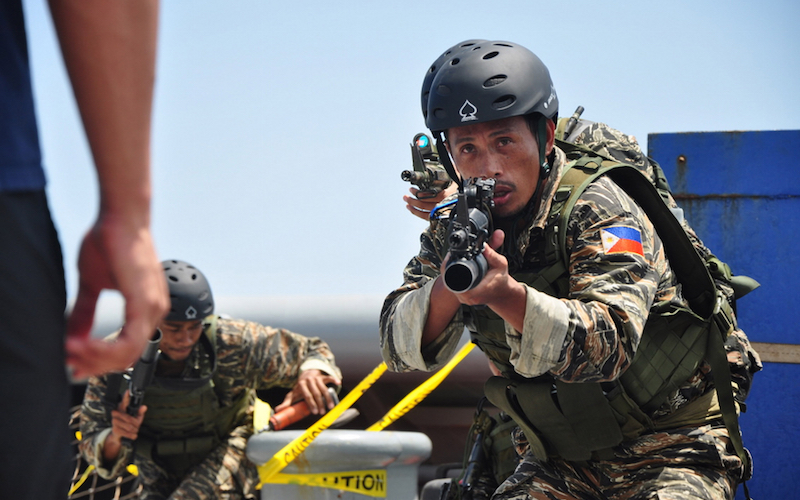
A Premature Peace Deal in the Philippines
Following a number of recent setbacks in the elusive search for a lasting peace in Mindanao, the Philippine Congress is trying to rush the passage of the Bangsamoro ‘Basic Law’ — a major component of the 2014 Comprehensive Agreement on the Bangsamoro — in the hope of enacting the law prior to a mandatory adjournment of the Congress next month. This may be the last real chance of enacting the Basic Law, given that political momentum is waning as President Aquino will soon enter his last year in office. If it does not pass, there is real question whether lasting peace will ever be achieved in Mindanao, as President Aquino has come closer than any other Philippine President to making peace a reality.
As the final peace accord between the Government of the Philippines and the Moro Islamic Liberation Front (MILF), the Comprehensive Agreement requires the formation of a new juridical entity called the “Bangsamoro,” which shall replace the existing Autonomous Region in Muslim Mindanao (ARMM). To do this, a law must be passed by Congress, following the parameters set forth in the Comprehensive Agreement. Once the bill is approved by both houses, President Aquino is expected to certify it as an urgent measure, in order to bypass the “three-reading requirement” under the Philippine Constitution.
Both the Comprehensive Agreement and its enabling Basic Law are regarded by the President as ground-breaking achievements under his administration.
As is the case with other international peace accords, the Agreement has set forth provisions for decommissioning arms, a plebiscite leading to the creation of core territory in Muslim Mindanao, power-sharing, wealth-sharing, and other normalization provisions. Aquino now seeks the passage of the Basic Law before Congress adjourns, and for a Bangsamoro autonomous government to be established in time for 2016 elections, as is called for under the provisions of the Law.
While many doubted the legitimacy of the MILF as a peace partner, many more thought that the MILF is simply too insincere and untrustworthy to reap the gains that stand to be gained through power sharing. In January this year, 44 members of the Special Action Forces (SAF) of the Philippine police were killed by MILF troops and by unidentified armed men after the former had been able to execute special mission Operation Exodus.
While government special action forces succeeded in killing their target – Zulkifli Abdhir, one of the FBI’s most wanted terrorists – the exiting forces were surrounded and the 44 SAF members were killed by MILF troops. MILF troops were reinforced by members of the Bangsamoro Islamic Freedom Fighters (BIFF), the main breakaway arm of the MILF. Dubbed the ‘Mamasapano massacre’ (or ‘Mamasapano’) after the name of the municipality where the fighting erupted, the death of SAF members sparked nationwide outrage, and is considered the biggest single loss of elite forces in Philippine history during peacetime operations.
When asked to respond, MILF chief negotiator Mohagher Iqbal blamed the government for failing to ‘coordinate’ with the MILF central committee according to the guidelines of a standing ceasefire agreement. Mamasapano forced Aquino and his allies to rethink whether peace is even possible with the MILF, many of whose members are known for a strong propensity for violence. Doubts about the MILF’s real degree of control over its subordinates became a central point of concern.
After Mamasapano, lawmakers from both Houses of Congress considered the peace process a failure, and many pro-administration congressmen withdrew their support for the Basic Law. While the Department of Justice announced that it will be filing formal charges against MILF and BIFF rebels who took part in the clash, to date, no charges have been filed. Thus far, the government is being accused of merely paying lip service to seeking justice for the families and relatives of the slain troopers. When the government earlier demanded the MILF to surrender all high powered firearms its rebel soldiers took from the SAF immediately following the encounter, the MILF at first did not comply, distancing itself from control and responsibility, and pinning the blame on the BIFF and ‘other armed groups.’ The MILF central committee eventually returned most of the firearms but, as intelligence reports show, it did so only after purchasing them from its subordinates – using government money purportedly provided by allies of Aquino.
A number of congressmen immediately sought an inquiry over Mamasapano, but President Aquino and his allies in Congress have managed to maintain the legislative agenda for a June enactment. Since Mamasapano, all congressional committee hearings for the Basic Law had voted strictly according to party lines. Earlier this month, committee hearings at the House were postponed due to the sheer number of new amendments introduced by House members and expert panelists. To save the process, President Aquino recently called for a special technical ‘dialogue’ with key congressmen at Malacañang (the presidential palace), with himself presiding, until an ‘acceptable’ draft for the Basic Law was agreed upon. While Aquino can be praised for successfully exercising party discipline under his Liberal Party, congressmen and senators feel offended by the extent to which Malacañang had intervened in what ought to have been purely legislative domain under ‘co-equal’ branches of government.
If the government had a difficult time saving face in seeking the return of the stolen firearms of its slain police from the MILF, many ask whether the MILF is really capable of achieving meaningful long-term decommissioning. Lawmakers accuse the MILF central committee of following an appeasement policy, because the more it would pressure its fighters to accept the terms of peace ‘from above,’ still more fighters would switch allegiance to separatist groups such as the BIFF. Since the Moro National Liberation Front (MNLF) was all but excluded from the talks, others claim that any outcome of the peace deal between the MILF and the government is something that at its core fails to be politically inclusive, and cannot possibly succeed in the long-term as a result.
There are also growing concerns over the role of Malaysia as peace intermediary and head of the International Monitoring Team, given that Malaysia has supplied arms to prior rebel movements in the southern Philippines, had provided refuge to ex-MILF combatants who fled from government troops, and gave political and financial support to the MNLF, the MILF’s predecessor. Adding to the conflict of interest is Malaysia’s own standing claim to Sabah, a territory that the Philippines, through the Sultan of Sulu, claims as its own.
Following Mamasapano, Aquino’s popularity ratings have slumped to their lowest since he took office in 2010. Many Filipinos consider Mamasapano to be the biggest debacle of his presidency. Be that as it may, the President and his congressional allies show no willingness to scuttle the Bangsamoro peace accords. Aquino is willing to expend a considerable amount of his remaining political capital by choosing to try to salvage his administration’s relationship with the MILF — even as it is becoming increasingly apparent that the MILF has already turned out not to be the sincere peace partner it said it was, and it should be.
There is considerable doubt that Aquino’s successor can sustain the momentum of peace, even if he or she is inclined to, which should certainly not be taken for granted, given the shifting nature of public sentiment and political winds. Peace partnerships are by their nature personality, event, sentiment and timing driven. While the wind ‘had’ been behind Aquino’s back early on in his presidency to make it appear that peace was indeed possible in Mindanao, now it appears that such belief may have been premature. The precursors of a lasting peace – which involves inclusion of all parties necessary to make an agreement not only achievable, but implementable and lasting – are not yet in place. The legitimacy and sincerity of the government’s primary negotiating partner is now very much in question, as a result of their own actions.
If Aquino’s efforts do result in the passage of the Basic Law, it is certainly questionable whether it will have legs. What seems more likely at this juncture is that a (possibly fatal) breach of the Law will occur if it is passed and implemented. Should this occur, and assuming the next President even has both the political will and public support to pursue a similar agreement with the parties in Mindanao, it will not be worth pursuing unless the flaws in the Aquino approach can be remedied. Given the lengthy history of conflict in Mindanao and its multifaceted nature, lasting peace could regrettably prove elusive for many years to come.
This article was originally posted in The Huffington Post.

